Discover our 2025 research report
Introduction
The European Union’s (EU) Green Deal has established a definitive trajectory towards achieving climate neutrality by the year 2050, setting forth fresh obligations for businesses. From January 2024, with a firm deadline by 2026, enterprises will be required to publicly report their sustainability efforts and implement reductions in their CO2 emissions, depending on their number of employees. For companies to thrive under these new regulations, it is imperative that they swiftly adopt and integrate strategies to transition to environmentally sustainable fleet operations.
Alphabet is keen to assess the advancement of companies on their “Road to Sustainability”. The question arises: are these companies adequately equipped to calculate the carbon footprint of their fleets and make data-driven decisions to methodically decrease their emissions over time? That is why we have once again reached out to fleet managers both within the EU and in non-EU countries like Switzerland and the UK to understand their approach to sustainable practices.
In the latest edition of the European Fleet Emission Monitor (EFEM) by Alphabet, insights from over 1,000 fleet managers across 12 countries and multiple sectors have been collected. The results underscore the significance of sustainability in managing fleets. However, as companies strive to put these principles into practice, a wave of disillusionment is appearing. They encounter a range of obstacles hindering their progress towards cutting CO2 emissions, from the complexities of digital transformation and precise emission tracking to the establishment of environmental goals and ever-evolving regulatory landscape.
Turning ambition into action: implementing sustainable corporate fleets in Europe
The survey indicates varied priorities regarding sustainability: 46% consider it a crucial factor in corporate decision-making (figure unchanged since 2024), while 41% acknowledge its importance but do not always prioritise it (also steady since 2024).
When looking at fleet management, however, sustainability continues to climb the corporate agenda. 60% of European companies cite the development of a sustainable vehicle fleet as a strategic priority – a slight decrease from the 64% reported in 2024.
Despite a growing interest in sustainability, it is surprising to note that over half of fleet managers (56%) do not consider the Corporate Sustainability Reporting Directive (CSRD) a major incentive to improve their sustainability measures, particularly in terms of collecting CO2 emission data.
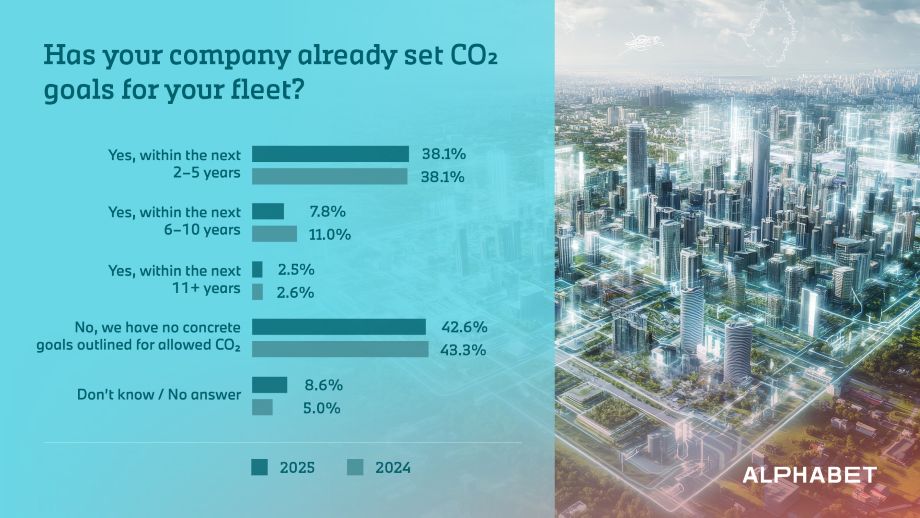
Navigating the path towards sustainability
Despite a common desire to address climate concerns, many companies are still figuring out how to begin their journey towards sustainability. The evidence shows that there’s some hesitation to put in place solid steps to cut down CO2 emissions. Only a little less than half of the companies (49%) have set specific sustainability goals, indicating that there’s work to be done in moving from good intentions to real-world action (52% in 2024).
Nearly 4 in 10 companies are getting ready to launch their sustainability goals by the next five years, showing real commitment to change. At the same time, a smaller group, about 1 in 7, are planning even further out, giving themselves more than six years to meet their objectives. Yet, 32% of businesses in Europe haven’t set any targets at all, an improvent from 43% in the previous year. With EU regulations demanding reduced car emissions by 2025, these companies need to start making plans soon, or they could be left behind.
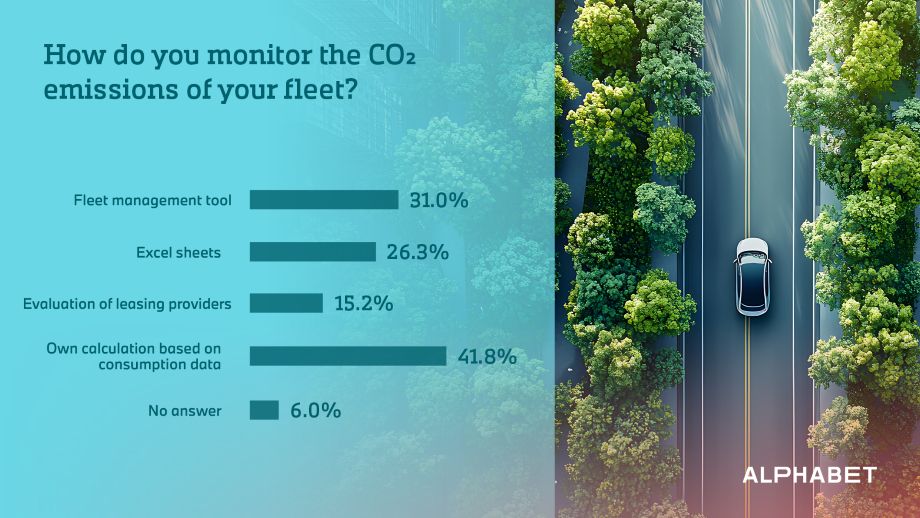
Seeking tools for making CO2 emissions transparent
A big hurdle to making progress is getting fleet management to go digital. This is important to measure CO2 properly and figure out how to lower it. But managing a fleet can be really tough and complex without the right technology. The survey found that 37% of businesses struggle to combine different digital tools in their everyday work. Also, a quarter of the companies find it hard to make sense of the data they collect.
Tracking emissions allows businesses to actively work towards meeting the CO2 targets set by the EU, helping to reduce their environmental footprint. As of now, 43% of the companies in the survey keep tabs on their fleet’s CO2 emissions, which is a small increase from the 42% recorded in 2024. Among those monitoring, 1 in 3 (35%) have successfully kept their fleet’s average emissions under 100g/km, a statistic that is nearly the same as last year’s. However, 44% of these companies still report emissions over 100g/km, although this figu is keeping stable since 2024.
On the other hand, around 22% of companies are still not able to report the specific CO2 emissions of their fleet.
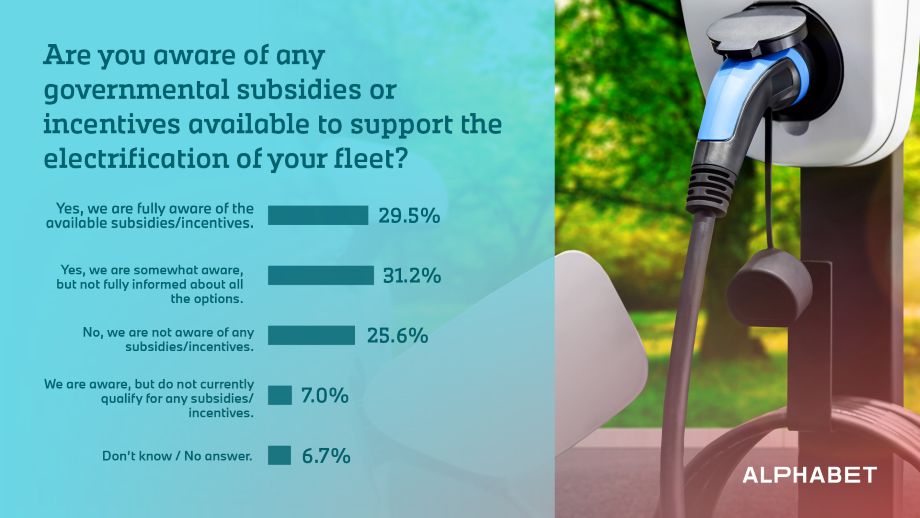

" "
"This year’s European survey shows that, while the industry is making progress, there’s still plenty of work to be done to help companies make better informed decisions, and to support them with their sustainability goals and emissions reporting."
Time is ticking: driving sustainable decisions with reliable data
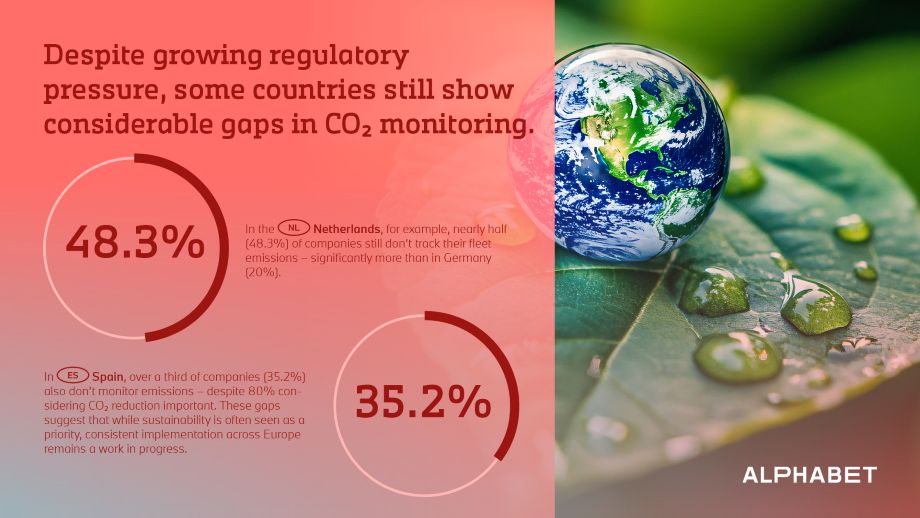
E-mobility: staying on track despite challenges
Despite the opportunity to significantly reduce CO2 emissions through e-mobility, still a surprising 43% of fleet managers feel inadequately informed to make the switch, however a slight dip from the previous year’s 44%. This hesitation is often due to the complexities of identifying which company cars can be feasibly converted to fully or partially electric, depending on specific use cases and employee needs. In such scenarios, the support of a partner specialising in e-mobility consulting can be crucial. They can provide bespoke advice and help develop a tailor-made strategy that best suits companies and employees, making the transition smoother and more effective.
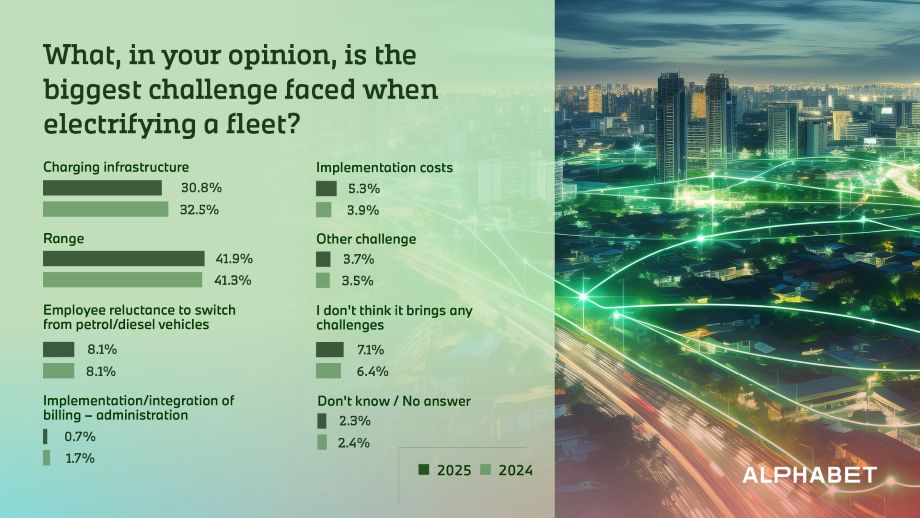
Charging infrastructure continues to be a significant barrier in the transition to electric fleets for 1 in 3 fleet managers, mirroring the 36% who felt the same in 2023. Additionally, concerns over vehicle range have intensified, now troubling 41% of managers, marking a 4% rise since 2023.
Despite these challenges, a solid majority (62%) of European companies are steadfast in their plans to electrify their fleets. This commitment, however, has seen a slight decline of 7 percentage points from the previous year’s figures.
Key findings
- More data, less direction: While more companies are tracking emissions, only 27% can accurately quantify their CO₂ output – showing that data alone isn't enough. Without digital tools and structure, information risks becoming noise.
- Digital progress still stalling: Despite rising pressure, 42% still rely on fuel-based calculations and 26% use Excel – outdated methods that hinder effective fleet management. Just 7% have begun integrating AI.
- Knowledge gaps persist – and hold fleets back: Nearly half of fleet managers still feel underinformed about electrification, infrastructure, and available support – a barrier to progress despite high awareness.
- Regulation isn’t enough on its own: The CSRD has had minimal influence on fleet planning so far, with more than half of companies unaffected and one third unsure of its relevance.
- Sustainability remains a structural challenge: One in three companies now have a dedicated sustainability department – an encouraging step, but overall planning remains fragmented across much of Europe.

